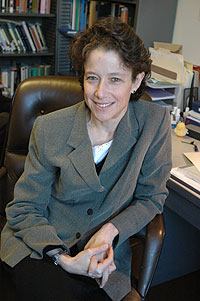Berkeleyan
Master teacher, master mentor
Kevis Goodman - winner of the 2005 Distinguished Teaching Award - has found that she doesn't need a 'big persona' to help students learn
![]()
 Videos: Kevis Goodman in action in the classroom and at awards ceremony Videos: Kevis Goodman in action in the classroom and at awards ceremony |
| 06 April 2005
 Kevis Goodman (Peg Skorpinski photo) |
But if Goodman has any tricks up her sleeve (besides an uncanny memory for names), they're low-tech and time-tested ones - like requiring each student to recite from memory The Canterbury Tales' 18-line prologue, in the original Middle English:
Whan that aprill with his shoures soote
The droughte of march hath perced to
the roote,
And bathed every veyne in swich licour
Of which vertu engendred is the flour.
"She says, 'Come recite it to me, and we can laugh at our bad pronunciation,'" recalls Hilary Menges, a former student of Goodman's.
In memorizing the lines, students get a sense of the language, so that Chaucer will begin to seem less alien to them, says Goodman, who has been named the sole recipient of the campus's 2005 Distinguished Teaching Award. This first assignment also gets students into her office - where conversation can sometimes wander from matters Chaucerian to one-on-one chats about the student's day-to-day life.
'A lot of lieutenants'
Keenly interested in effective teaching, Goodman pursues that end in her own lecture courses and seminars - and by actively mentoring the graduate-student instructors (GSIs) who help teach high-enrollment courses. This year she and Ph.D. student Arthur Bahr collaborated in designing a department- and discipline-specific course for English-department GSIs on how to teach college writing skills - a course she plans to teach in the future. Since good writing and clear thinking are closely linked, she says, "in some ways the most long-lived thing we can help our students do is to write well and then be able to read critically and edit their own words."
Her GSIs attend weekly group meetings during the semester, where Goodman offers pointers on teaching and talks with them about their study sections. In this way the undergrads' particular problems with the course material come more clearly into focus.
Grad students repay Goodman's intense interest in their progress with "unsurpassed" loyalty, says Fiona Murphy, a doctoral student in English. Goodman received a campuswide GSI Mentoring Award last year. And, importantly, GSIs go the extra mile in her classrooms.
"She has a lot of lieutenants who are giving it their all," says Murphy. "All of the effort she puts into helping us be increasingly good teachers really has an effect on the classroom and helps the undergraduates."
Always going back to the text
When Goodman was hired at Berkeley in 1997, some told her that, to hold students' attention in a lecture hall, she'd need to become a classroom "performer." "But I don't think of myself that way," Goodman says. "I feel kind of shy, actually. I think of myself as more of an intimate teacher."
Is it essential to have a big stage persona? "To assume that is what it takes to pitch texts and ideas to Berkeley students is to sell them short," she concluded. "Mere performance would not hold them for a 16-week term." Instead, what she could and should do, she thought, was be herself and "display pleasure in the material."
Standing at the front of a lecture hall, serious but gracious in demeanor, Goodman speaks slowly and clearly, provides lots of supplementary handouts, pauses to engage with students, and leads them repeatedly back to the text.
"She has the students keep the book open in front of them and go back and forth between close readings of the text and broader arguments," says Genevieve Guenther, a recent Berkeley Ph.D. recipient.
Reconsidering 'dreaded' works
By such means, Goodman has a way of making "dreaded" 16th- and 17th-century works like Spenser's Faerie Queene and Milton's Paradise Lost - and the writing of the 18th-century and Romantic authors in whom she specializes - pertinent and engaging to 21st-century students. "They're afraid of [these writers]," Menges says. "They expect them to be boring and hard."
Esther Pun, an '04 grad, recalls her own about-face on Milton under Goodman's guidance: "He's not just a dead white guy who wrote about paradise and Adam and Eve. He was making political statements and grappling with questions about how we can acquire knowledge."
Eventually, says Goodman, most students come to "adore" Milton - his opposition to censorship, his way of drawing readers' attention to the effects of the media revolution of his time (the explosion of printed literature made possible by the printing press), his notion that good and evil come into the world finely intertwined and that human beings, to sort them out, must engage in what he calls "trial by contrary."
"That idea - grappling with everything in order to reject certain things - strikes a deep, deep, deep chord" in young people who, in coming to Berkeley, "have been thrust into the process of decision-making in a new way," Goodman says. "They love that aspect of Milton which values, above all things, the capacity to choose."
She takes great pleasure in guiding students out of "the haze of their preconceptions - 'this is religious and therefore boring, Milton is orthodox and therefore boring, Eve is evil'" - to new appreciations of the beauty and relevance of such works.
"There are those moments," Goodman says, "when you are developing an argument over the course of a class, and it all comes together, and you get that chill. Others are getting it. It's great to see the lights go on."
Kevis Goodman will be honored at the 2005 Teaching Awards ceremony, set for 5 p.m., Thursday, April 21, in Morrison Library, 101 Doe Library.

